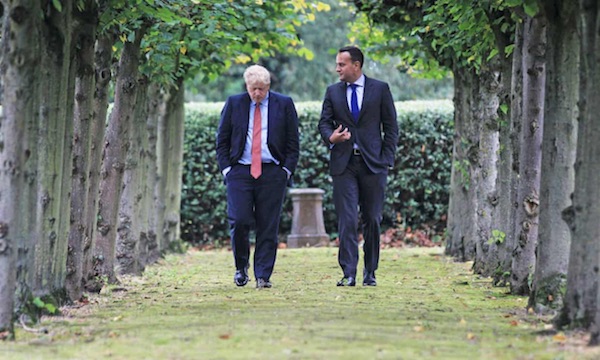
The British government and the European Union are being urged to seize the moment to prepare for peaceful Irish unification after Brexit negotiators shied away from a disastrous agenda to reinforce partition.
A plan by British Prime Minister Boris Johnson to repopulate the border area in Ireland with British customs installations and patrols was globally condemned last week. Faced with a deadline for a deal just weeks away, calls for a date for a referendum on Irish unification are now being backed by some hardline Tories as a solution to the standoff.
Johnson’s plan for a ‘remilitarised zone’ was denounced in Ireland, Europe and across the world, but especially in the USA, damaging Tory hopes for a signature new trade agreement following Brexit.
After three years of bowing to the DUP’s demands, one Tory opinion-maker has now expressed his exasperation at unionist attempts to subvert the will of the majority in the north of Ireland and in Britain.
“The EU talks are still in danger of collapsing because of Northern Ireland at a time when the majority of people who live there think they will be part of a united Ireland within ten years,” wrote the head of an influential London-based right-wing think tank.
In an article prominently featured in the Daily Telegraph (known as the ‘Torygraph’ for its close links to the Conservative party) David Green backed calls for a vote on Irish unity.
“Northern Ireland has long been a millstone round the neck of the rest of the UK and to fail to take back our independence because of it would be an historic tragedy,” he wrote.
Green, the head of Civitas, which has links to the far-right Tory ‘European Research Group’, argued the British government had long sought to ‘bribe’ the north’s population to remain under British jurisdiction through high public spending -- but he noted living standards in the 26 Counties are still far higher.
“It is not widely known that it costs the UK more to support Northern Ireland than it does to be in the EU,” he wrote, arguing that a customs border in the Irish Sea was the best solution for resolving the impasse over Britain’s departure from the EU.
“But if the DUP continues to block this obvious remedy, then a referendum on Irish unity will be the best way forward for everyone, in Northern Ireland, the republic and the rest of the UK.”
It is no coincidence that a Tory plan for a ‘customs partnership’, which could remove the need for checks on the border, is back on the agenda for talks.
Negotiators are also reported to be looking at various options on “consent” to prevent a return of a hard border. Efforts by the DUP to secure a veto over Brexit at the Stormont Assembly now appear unlikely to succeed -- an explicit appeal by DUP MP Jeffrey Donaldson for support for a unionist veto was described as letting the “cat out of the bag” by Sinn Fein MP Elisha McCallion.
At a time when relationships between the islands are being redefined, negotiators are being urged to use the opportunity to open a pathway for the reunification of the island.
Speaking at the launch of ‘The EU and Irish Unity’ report in the European Parliament in Brussels this week, Sinn Fein’s Michelle O’Neill said: “In Ireland we are at a crossroads. We are facing a time of immense political challenges, but also opportunities.
“A growing number of people on the island of Ireland believe that Irish unity is the democratic alternative to the unwanted Brexit being foisted upon citizens here, and Irish unity is now at the forefront of Irish politics.
“The real prospect of a referendum on Irish unity in the near future must also feature strongly in the ongoing Brexit negotiations between the EU and British government.
“The EU have a key role to play in assisting the transition to Irish unity. The EU should ensure that negotiations on the future relationship post-Brexit give consideration to the right to self-determination as provided for in the Good Friday Agreement.
“It should also put in place structures to consider the impact of Irish unity and to ensure that the voices of people across the island are heard and, crucially, consider what additional supports and arrangements need to be put in place in order to facilitate Irish unity.
“The EU must also bring political and diplomatic pressure to bear on the British government to ensure they fulfil their obligations under the Good Friday Agreement, allow for self-determination and consent to the holding of a referendum on Irish unity.
“The people of the island of Ireland should have a choice between Brexit and Irish unity.
“I would appeal to the EU not to be bystanders in this conversation, but to be advocates for democracy, choice and the right to self-determination.”
![[Irish Republican News]](https://republican-news.org/graphics/title_gifs/rn.gif)
![[Irish Republican News]](https://republican-news.org/graphics/title_gifs/harp.gif)

